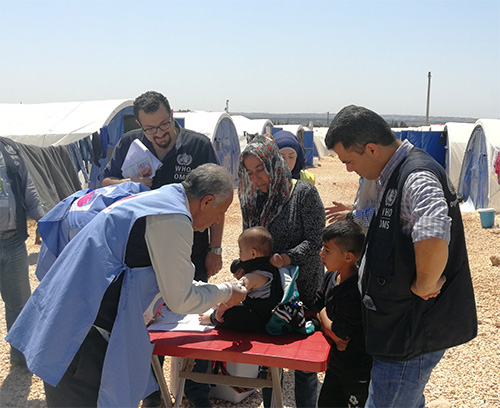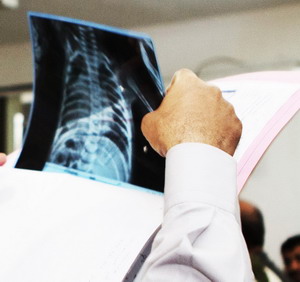Advancing paediatric care in Syria
 Three-month old Safaa after her surgery, made possible with the support of the Bambino Gesú Hospital
Three-month old Safaa after her surgery, made possible with the support of the Bambino Gesú Hospital
17 June 2019, Damascus, Syria – With support from WHO, a team of senior medical specialists from the Bambino Gesú hospital in Rome (the largest paediatric hospital in Italy) has just concluded a one-week visit to Syria to work with their counterparts in the Paediatric Hospital in Damascus.
The team has made several visits to Syria as part of a collaborative programme to build the capacity of the Paediatric Hospital in Damascus. WHO supports the hospital with state-of-the-art equipment and supplies, while specialists from Bambino Gesú provide supportive supervision and practical training on the latest techniques and advances in paediatric surgery.
WHO condemns attacks on 3 health facilities in north-west Syria
5 April 2019 – The World Health Organization (WHO) strongly condemns the consecutive reported attacks on 3 health facilities in north-west Syria on 28 and 30 April. The attacks resulted in damage to infrastructure, putting them out of service.
Of the 3 facilities attacked, 2 were hospitals located in northern Hama providing life-saving medical services to thousands of vulnerable populations affected by increased hostilities over the past weeks. The first hospital hit, in the early hours of 28 April, offered general surgery, maternal and child care services to approximately 8000 beneficiaries per month.
On the same day, in the late afternoon, the second hospital was hit which provided, on average, 1300 medical outpatient consultations and over 300 major and minor surgeries per month. With these hospitals out of service, there is only one other hospital remaining in the area to provide secondary healthcare services. The other facility was located in Idlib, providing on average 1500 primary healthcare consultations per month.
WHO-supported vaccination campaign to immunize 2.8 million children against vaccine-preventable diseases
 WHO-supported vaccination team is providing immunization services to children in Fafin camp for internally displaced people in rural Aleppo. Photo: WHO/Syria 201922 April 2019, Damascus, Syria ‒ Over the next 6 days, the World Health Organization (WHO), in cooperation with the Syrian Ministry of Health and UNICEF, will conduct a series of national immunization days to immunize children under the age of 5 against vaccine-preventable diseases, including tuberculosis, pertussis, diphtheria, polio, tetanus, hepatitis B, haemophilus influenza, measles, mumps and rubella.
WHO-supported vaccination team is providing immunization services to children in Fafin camp for internally displaced people in rural Aleppo. Photo: WHO/Syria 201922 April 2019, Damascus, Syria ‒ Over the next 6 days, the World Health Organization (WHO), in cooperation with the Syrian Ministry of Health and UNICEF, will conduct a series of national immunization days to immunize children under the age of 5 against vaccine-preventable diseases, including tuberculosis, pertussis, diphtheria, polio, tetanus, hepatitis B, haemophilus influenza, measles, mumps and rubella.
WHO aims to vaccinate approximately 2.8 million children under the age of 5 in 13 governorates in Syria. The campaign will focus on reaching almost 250 000 children who were not vaccinated during previous campaigns. Over 6800 vaccinators and 2487 mobile medical teams will be deployed to 900 public health centres and 1268 temporary vaccination posts. WHO is providing technical support to the Ministry of Health and covering the operational costs of the campaign.
Routine immunization is one of the building blocks of primary health care. It offers every child the chance of a healthy life from the outset. The campaign aims to raise awareness of the importance of vaccines and encourage parents to bring their children to be vaccinated.
‘’Immunization saves millions of lives and is widely recognized as one of the world’s most successful and cost-effective health interventions,” said Ms Elizabeth Hoff, WHO Representative in Syria. ‘’To give just one example, between 2000 and 2016, measles deaths dropped by 84% worldwide because of vaccination. WHO is committed to continuing its efforts to protect all children in Syria against vaccine-preventable life-threatening diseases,” Ms Hoff concluded.
The campaign coincides with World Immunization Week, which aims to promote the use of vaccines to protect people of all ages against disease. It is celebrated globally each year in the last week of April and the theme of this year’s campaign is “Protected Together: Vaccines Work!”
Related link
Kawthar defeats tuberculosis: improving access to diagnosis and treatment in rural areas in Syria
 Screening to detect TB among high-risks groups improves health outcomes for people with TB and reduces transmission 27 March 2019, Damascus, Syria ‒ 35-year-old Kawthar is one of the tens of thousands of Syrians who fled intense fighting in Afrin city, north-west Syria last year. She and her family now live in a camp for displaced persons in northern rural Aleppo. In late 2018, a team from the World Health Organization visited the camp to screen people suspected of having tuberculosis (TB). Kawthar was one of several people confirmed as having the disease.
Screening to detect TB among high-risks groups improves health outcomes for people with TB and reduces transmission 27 March 2019, Damascus, Syria ‒ 35-year-old Kawthar is one of the tens of thousands of Syrians who fled intense fighting in Afrin city, north-west Syria last year. She and her family now live in a camp for displaced persons in northern rural Aleppo. In late 2018, a team from the World Health Organization visited the camp to screen people suspected of having tuberculosis (TB). Kawthar was one of several people confirmed as having the disease.
Kawthar was pregnant when she was first diagnosed. She refused to take her medicines because she was worried that they might harm her unborn baby. Health care workers explained to her that her condition was life-threatening and, if left untreated, would only get worse. Kawthar agreed, with some trepidation, to undergo the lengthy treatment for the sake of her family.


